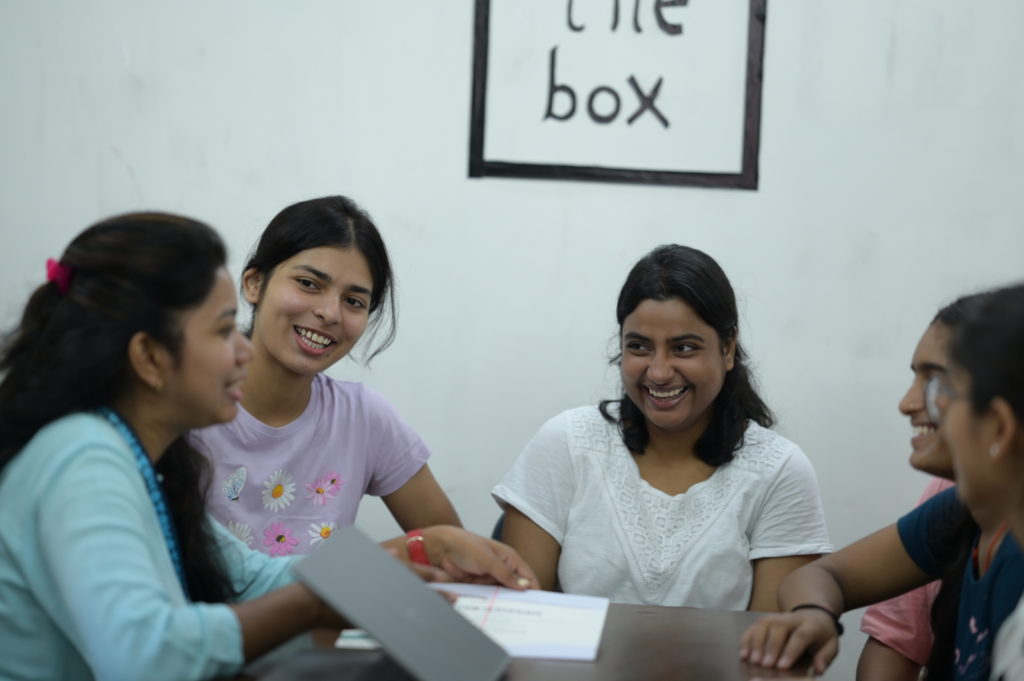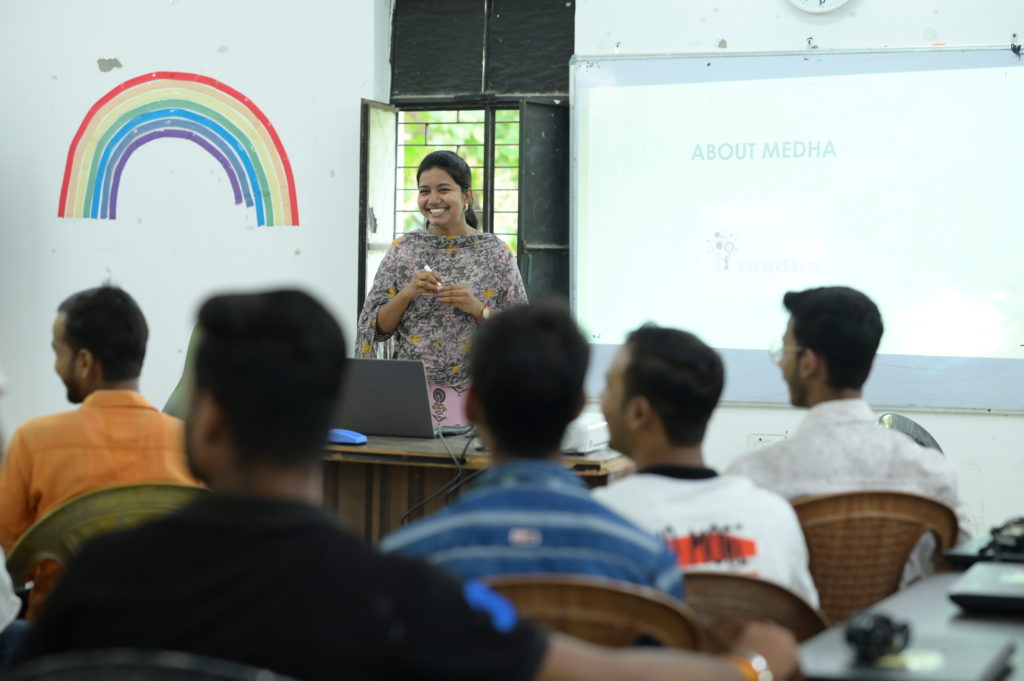
From campus to community
I often go on field visits to evaluate and understand the impact of Medha on the lives of young adults. On one such visit to the Iswar Saran Degree College in Prayagraj, I witnessed a very different campus environment than in other colleges.
I had usually observed that young men held themselves back when speaking up or participating, especially if they perceived our programs as only for ‘women empowerment’ or if women were in the majority. But that was not the case here: students were more participative and had a lot of questions to ask – irrespective of their gender.
I wanted to know why things were different. On interacting with the field team, I realized how the college showing up as partners (not just as clients) for Medha programs made a difference. Since the college had also presented Medha as a partner vouched for by all staff – many students participated freely, including young men.

A collaborative relationship drives greater impact
Higher education is a pivotal juncture in a student’s life, where they not only acquire academic knowledge but also shape their values, build a sense of community, and discover themselves in the process. It’s a time for personal growth and exploration, and colleges play a vital role in facilitating this transformation.
However, many government colleges in India need more resources or capacity to create a transformational experience. This is where Medha helps bridge the gap – our experiential, 21st-century skill-building programs and activities on campus enable meaningful learning experiences and communities for students.
“I got the true college experience. Generally, a lot of interaction doesn’t happen in government colleges as many students remain absent and don’t take college seriously, but Medha led to a culture shift. Not only did I overcome my fears and do an internship, I also met many new people.”
– Ashish, Class of 2023.
But Medha cannot act alone on campus. Our relationship with a college isn’t transactional, it goes both ways. While we bring a new approach and expertise, colleges (like Iswar Saran) bring a few best practices that drive greater impact:
1) It’s not just about the placements
Here, a college truly believes in the importance of 21st-century skills and is down to trying new ways in which students’ career outcomes could be impacted.
Many colleges judge the impact of our programs by the number of placements – an important but not all-encompassing metric. Things change when the college leadership also values a longer game of upskilling students, providing workplace exposure, and co-owning outcomes.

2) Bring in the local context
While Medha has a structured and proven method of pitching to college students, we could always use more input in the contextual knowledge about an area or college and what works or does not work.
For example, at one of our partner colleges, a Training & Placement Officer once shared her input on how, when, and where to pitch. Since the college’s students often aimed for government exams, she asked us to discuss how soft skills will better prepare them for their aspirations and how more career options are available – which they should discard only after deeper consideration.
While Medha does its job, a little input or guidance goes a long way in creating a more student-centric experience.
3) No one is a third party here
Often, a college may provide a dedicated office space where our facilitators interact with other staff members. Such interactions help us time programs in a way that does not interfere with college schedules and, at the same time, operate without breaks.
It’s also helpful when a college feels invested and presents ‘Medha’ as an equal party – not a third or external party – during student interactions. For instance, during one of our pitches, the college staff took the initiative to motivate students by giving them examples of our program’s impact on older alums.
Collectively, such acts help students perceive our program as an essential part of their college experience.
Ashish shares,“Our Training and Placement ma’am came during a program certification ceremony. The way she spoke about Medha – I felt that my college supported them. I also saw huge posters of Medha outside the Training and Placement office. My confidence in Medha’s dedication to support us increased.”

4) It’s about creating a culture
Whenever Medha organizes an event, most colleges provide a space to install a desk at a central place – such a presence nudges students to stop and think about their lives after college.
Colleges also set the ground and introduce Medha to smaller groups of students in classrooms. They understand the importance of creating a culture where students hold dialogues regarding their career aspirations and facilitate our initiatives to improve student engagement.
“We don’t know everyone in college, but when we learn someone’s in a Medha program, we feel like a part of the same community. We call each other ‘Medha bhai’ and shake hands even if we don’t know our names – it’s built into our identity.”
From campus to community
Our programs can run on any campus, but a college’s active support and participation make a sizeable difference in how students perceive and access them.
When a college goes beyond a stakeholder role to present itself as a partner, it brings credibility in the students’ eyes to commit to the program without apprehension. It creates a culture where students feel colleges are equally invested in their goals. And it shifts students’ mindsets so that they ‘trust the process’ of learning.
Ultimately, we are more likely to succeed in our shared aim – to benefit students – as by working as one, we turn campuses into communities that offer transformative experiences for youth.
“I had no big expectations from college, I only wanted a degree. After school, a lot of my peers went to big city colleges, and I saw on social media how they made groups and enjoyed college life – how their personalities improved. That was totally missing from my college life – but it changed after I joined Medha. It truly felt that the college supports and appreciates Medha’s presence. And I felt the college cares about us. I found a community.”